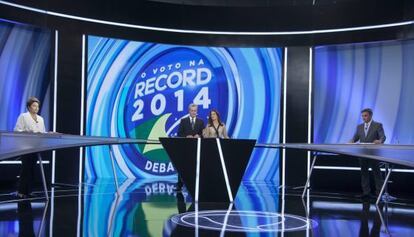Brazil’s presidential race divides the country in two
Polls show a dead heat between Rousseff and Neves ahead of Sunday’s runoff vote


The popular Brazilian columnist and screenwriter Gregório Duvivier was eating in a restaurant in a good Rio de Janeiro neighborhood when a sour-faced man approached him, wanting to get into a fight. The stranger rebuked him over his politics, called him “a caviar leftist,” and said he was leaving because if he didn’t, he would hit him. “I have gone through a trial. I have been booed, but I had never seen such rage,” the columnist said in Época magazine on Sunday. Duvivier’s offense was that he had written an article endorsing Dilma Rousseff in Brazil’s presidential race.
This is just one symptomatic example of the atmosphere in Brazil these days – on the streets, in newspapers, on Facebook, and on TV. The country is polarized, tense, and it seems to have been reduced to two enemy groups. The election campaign is entering its final phase and the contenders, incumbent President Dilma Rousseff of the Workers’ Party (PT) and Aécio Neves of the Brazilian Social Democratic Party (PSDB), are tied in the polls. Brazil has not seen a dead heat like this in a long time – not since after the military dictatorship in 1989, when Luiz Inácio Lula da Silva and eventual winner Fernando Collor de Mello ran a close race in the second round.
It seems as though the country is not only divided in the polls but also geographically
The candidates did not resort to low blows or mean accusations about lining up family members for government posts during Sunday’s TV debate. No doubt both advised by their teams that a vulgar fight would not benefit anyone, Rousseff and Neves fell into a more boring and technical discussion that focused on how the economy was going. Or, to be more precise, on how it was not going, stuck as it is in a technical recession and facing – whether Brazilians want it or not, and no matter who wins – an inevitable adjustment after this Sunday’s runoff vote.
Neves focused a good number of his accusations – and promises – on how Brazil is no longer growing as it used to, saying there must be change or it will not grow again. Rousseff told him not to be so pessimistic, reminding him that unemployment is under five percent and that a month ago the United Nations removed Brazil from its list of food-poor countries. Basically the contenders re-enacted the dichotomy that often sums up this campaign: PSDB will make the country grow; PT will keep looking out for the poor.
It seems as though the country is not only divided in the polls and by color – the red of the PT versus the PSDB’s blue – but also geographically. Almost all of the poorer and less-educated northern and eastern parts of the country support Rousseff; the more industrialized south and west have more resources and favor Neves. Large cities such as São Paulo prefer the PSDB. The small, sparsely populated villages back the PT. There are musicians and soccer players supporting both camps and economists taking sides.
One pulled Workers’ Party ad suggested Neves used to drive while drunk or high
Meanwhile, election tribunals have pulled a total of 14 TV ads produced by both camps for being excessively slanderous or offensive. A PT ad suggested that Neves used to drive while drunk or high in 2011, which was allegedly why he refused to take a blood-alcohol test. In a PSDB ad Rousseff was accused of pulling strings for her brother in the mayor’s office in Belo Horizonte (Minas Gerais).
Newspapers and magazines are full of stories about supporters of both camps who have been forced to shut down their Facebook accounts for verbally harassing their rivals. There have also been fights on university campuses.
In this last week of campaigning, there will be polls, interviews and conferences. On Friday, the presidential hopefuls will hold the final and definitive TV debate. Everything is set to break the deadlock that has divided the country in two.
Translation: Dyane Jean François







































